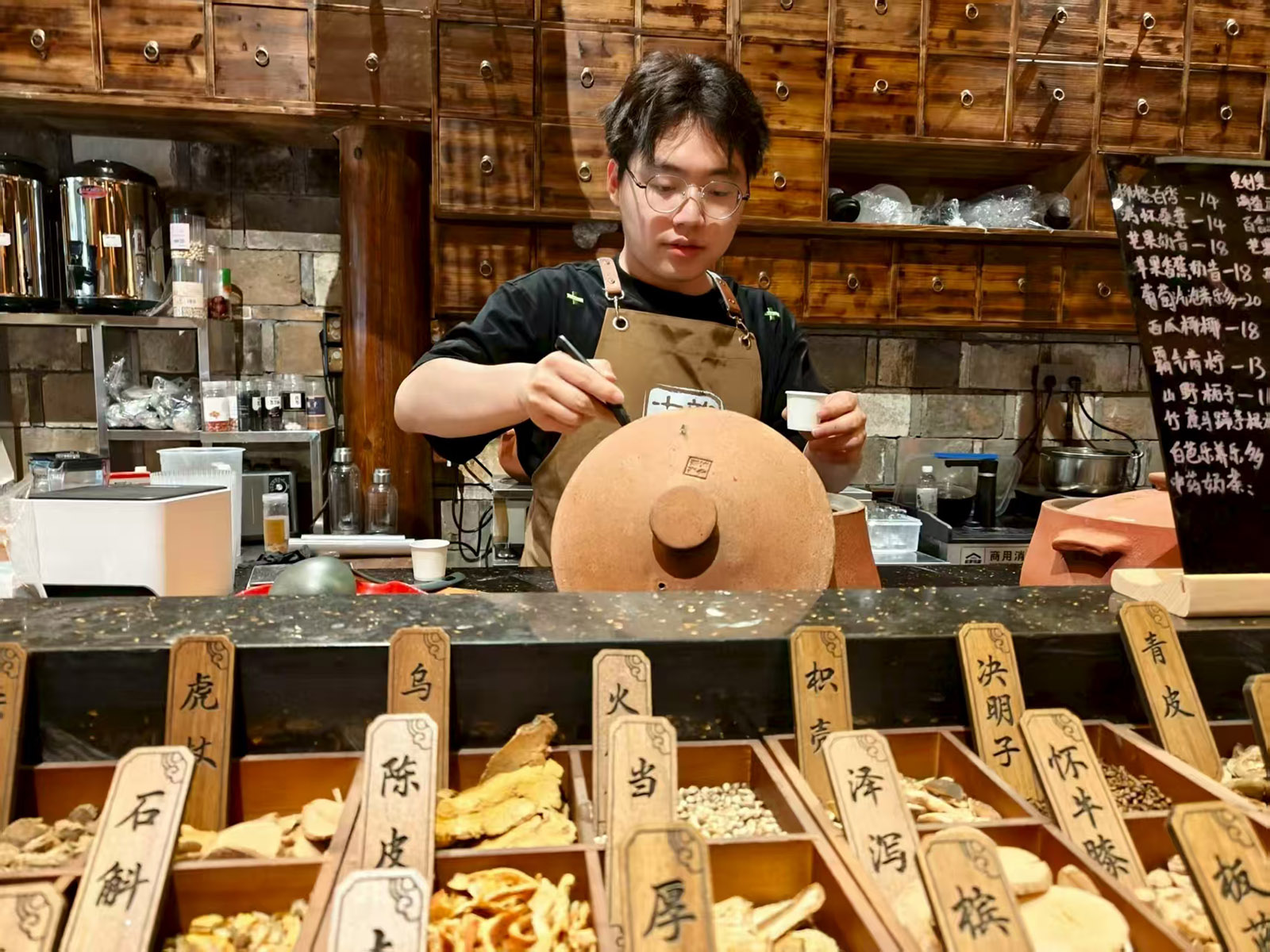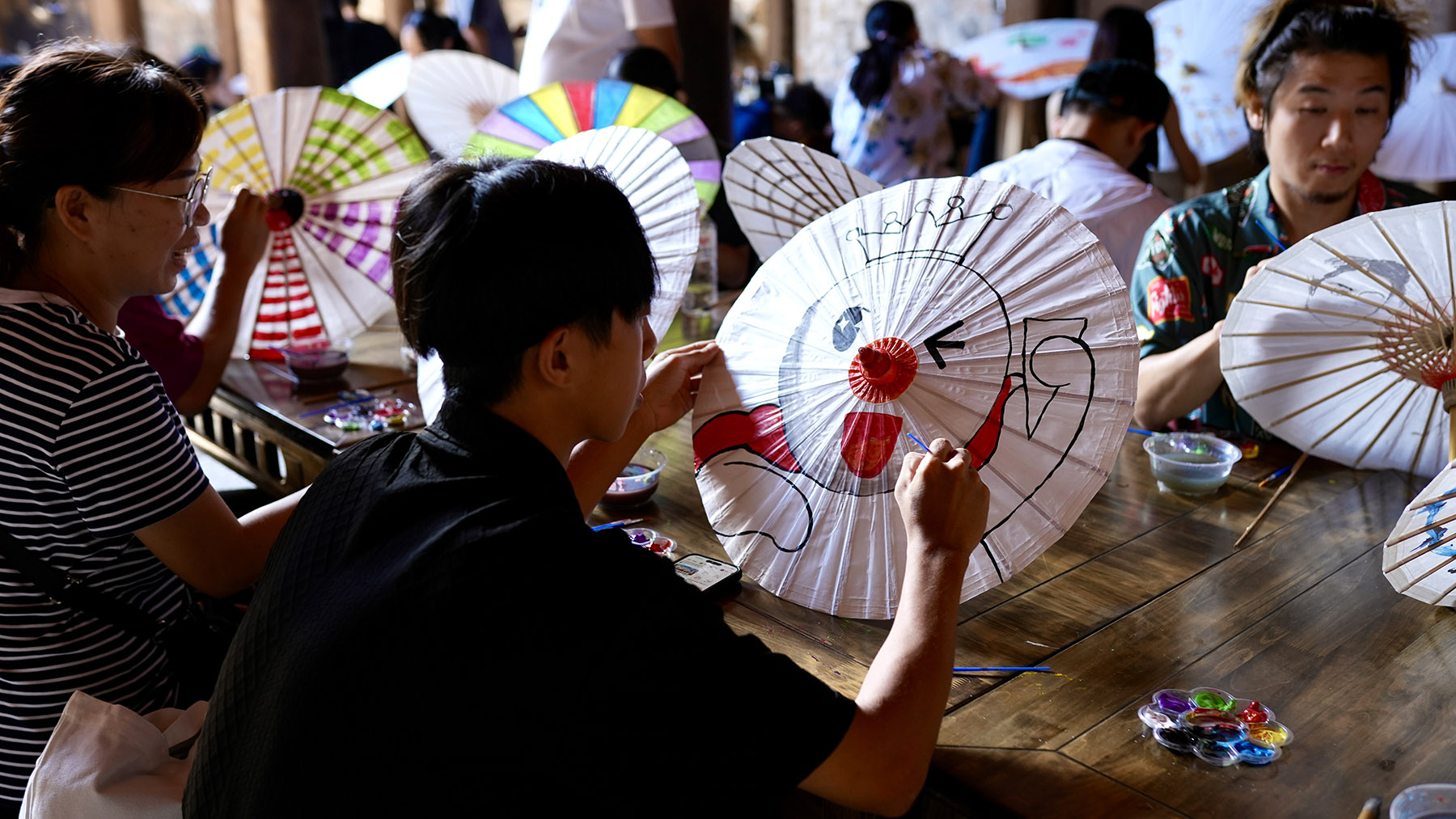Young people transform Chongren's ancient streets with herbal teas and steamed buns, blending tradition, innovation and entrepreneurial energy, Yang Feiyue reports in Nanping, Fujian.

A fresh, herbaceous scent cuts through the cool morning air hanging around the stone-paved street of Chongren Ancient Town, Guangze county, Nanping city of Fujian province. It emanates from the open door of Caobentang (Herbal Hall), where 22-year-old Gao Lingxu tends to simmering pots of dark, aromatic tea after a counter filled with assorted herbs.
He slowly churns the brew, observing its color and texture, while ladling it up for sporadic early customers.
"We have to prepare early," says Gao who has tapped into the rich local traditions of Chinese medicine and rolls out trendy herbal milk tea that is proving a hit among young visitors.
His shop offers 17 different drinks, from pure herbal teas to creamy milk-based versions. Popular concoctions promise to "reduce internal heat", "strengthen the spleen", "moisten the lungs", or "calm the nerves".
The venture has been a success. Since opening earlier this year, the shop has averaged a monthly profit of 30,000 yuan ($4,223), with peak daily revenue reaching 6,000-7,000 yuan.
He now manages a core team of three, which expands to eight with part-time help during busy periods.
Just over a year ago, Gao's life was on a different track. A 2023 graduate in the Internet of Things, he was working in the provincial capital city of Fuzhou, in e-commerce and software development.
"The pressure wasn't just physical. It was the mental exhaustion that was overwhelming," Gao recalls.
"The environment was stifling, intensely competitive. I felt drained, with little positive feedback and no clear sense of a future," he says.
The turning point came in early 2024 during a spring visit to his hometown in Guangze, where he stumbled upon a local government policy that would change his life.
In September 2023, the Nanping government launched a countryside vitalization initiative that actively encouraged students, entrepreneurs and skilled individuals to return to local rural areas, offering a package of support measures.

Chongren has since built platforms to clear the way for youth employment and entrepreneurship.
"We have revitalized 66 idle assets into venues for young entrepreneurs, created three business incubators, and developed nine collaborative projects," says Rao Yuanhui, an official with the Chongren town government. This has attracted 12 young startup teams and fostered more than 10 new business formats, including Gao's herbal milk tea.
"Furthermore, we are building youth communities to foster collaboration, transforming individual operations into synergistic partnerships through integrated experiences like food and intangible cultural heritage," Rao adds.
Policies have also lowered the barriers, creating fertile ground for youth.
"We address their primary concerns — funding and skills — with tailored one-village-one-policy measures based on local resources," Rao says.
For instance, Chongren offers young entrepreneurs three years of free rent and one year of free accommodation. City-level mentors and successful, local entrepreneurs have also been invited to provide resources and connections.
For Gao, the most compelling offer was practical: a rent-free, renovated shop space in the recently restored Chongren street that used to be bustling during the Ming (1368-1644) and Qing (1644-1911) dynasties, allowing him to "move in with just a suitcase".
"This policy reduced our startup costs to almost zero," Gao explains. "For young graduates, what we have most is time and energy. What we lack is capital and resources. The government solved that for us."
Tempted by the offer, Gao started market research and noted that herbal teas have integrated the ancient wisdom of traditional Chinese medicine with modern lifestyles.
"In today's society, people have become increasingly discerning about beverages. They seek both great taste and health benefits. That's why herbal milk tea holds such promising potential," Gao explains.
He then spent half a month in Nanchang in the neighboring Jiangxi province, learning the basics of crafting herbal teas.
But the real innovation happened in the ancient town itself, and his chief adviser is a veteran local doctor of traditional Chinese medicine.
"When I develop a new product, I consult the doctor," Gao says. "I need to know if the herbal effects will clash or synergize. He provides authoritative guidance on pharmacology," he adds.
Local resources also give him an edge, since Guangze is known for its many varieties of high-quality herbs, which he can source within minutes.
Another young returnee, Guan Jiyang, fills the air with the comforting smell of fresh mantou (steamed buns).

The man, who is in his early 30s, once worked in Guangdong province's bustling furniture industry, a world of client banquets and relentless deadlines.
"The pressure was high," he recalls, his hands deftly shaping dough infused with purple rice. "It was a cycle of work and social drinking. I felt drained."
The same government policy that beckoned Gao home also appealed to Guan, who found his inspiration in a family legacy.
His mother had made traditional mantou for over 20 years. He saw an opportunity not to replace her craft, but to elevate it.
"Many people see bread as sophisticated, but mantou as plain," he explains. "I thought, why can't we make a Chinese-style steamed bun that is both beautiful and tasty?"
He and his mother now wake up at 5 am daily to source fresh ingredients, committing to a recipe that uses no food additives, only whole foods like red dates, local red beans and various nuts.
His shop is a family affair, with his brother handling their social media presence on the short video platform Douyin, while Guan and his mother manage production.
Since opening in July, the business has found its footing, earning about 1,000 yuan a day and attracting a loyal clientele of children, parents and the elderly who appreciate its natural approach.
The transition from factory floors to flour-dusted counters came with an adjustment, but Guan has no regrets.
"Of course there was a sense of disparity at first," he admits. "But now, I prefer it here. This life has more of a human touch."
Gao and Guan represent part of a larger movement that is vitalizing the countryside and is powered by incentive-based policies to support young people and migrant workers in returning to their hometowns to start businesses.
Yunnan province recently issued several measures to support college graduates and other youth in returning to their hometowns to start e-commerce businesses. The measures focus on addressing the practical difficulties young people face in e-commerce entrepreneurship. They emphasize strengthening the supply chain and product chain for e-commerce ventures in plateau-specific agriculture, cultural tourism, wellness and border trade.
ALSO READ: Born of leaf, clay and ritual
This approach aims to help young people identify entry points for entrepreneurship. In May, Hubei province unveiled a plan for promoting the return of migrant workers to start businesses in their hometowns.
According to the plan, Hubei aims to achieve an annual increase in the number of new hometown entrepreneurship entities equivalent to about 2 percent of the migrant worker population.
By 2027, the province plans to establish more than 200 entrepreneurship parks and bases for returnees.
For Gao, opening his herbal tea business in the ancient street means more than a career choice. As he spent his childhood running over the flagstones with his friends, every corner holds his memories.
"Returning home to start a business has not only allowed me to realize my personal value but also brought me a profound sense of inner peace and belonging," Gao says.
As he sees his hometown has grown more vibrant and the old street has regained its charm, he has become certain that his decision to return was right.
Contact the writer at yangfeiyue@chinadaily.com.cn


